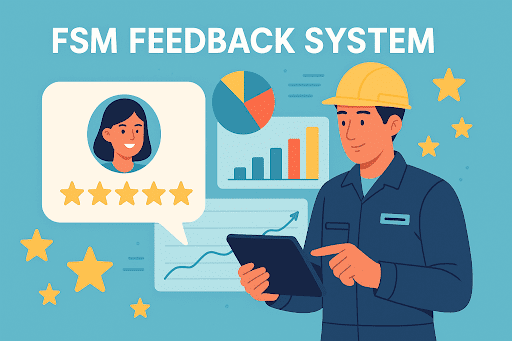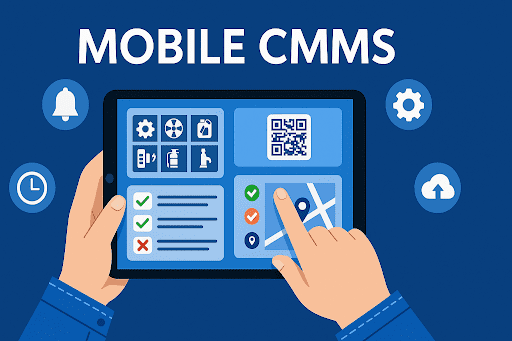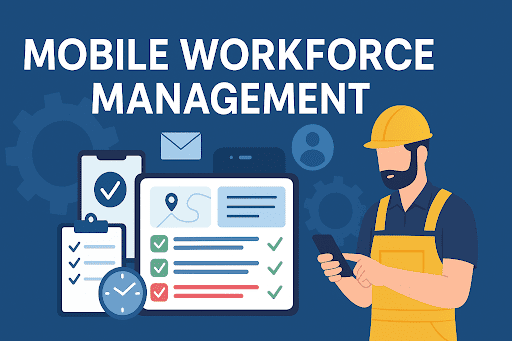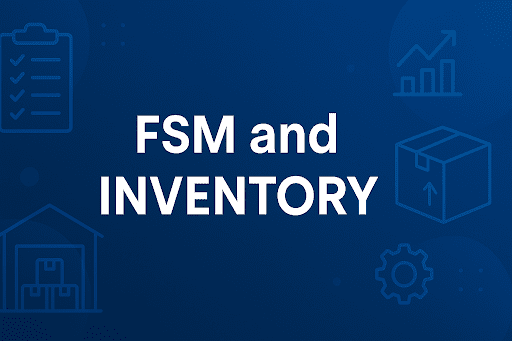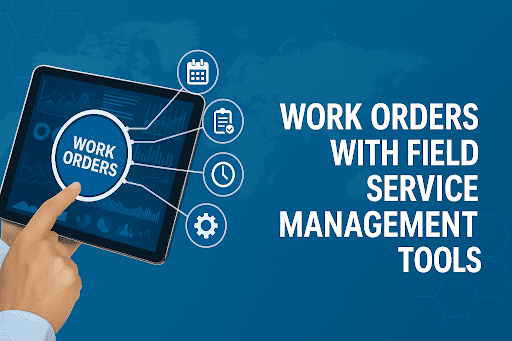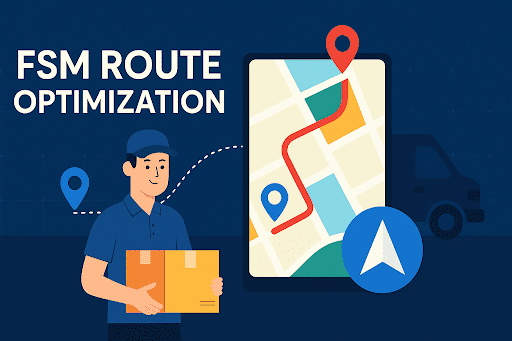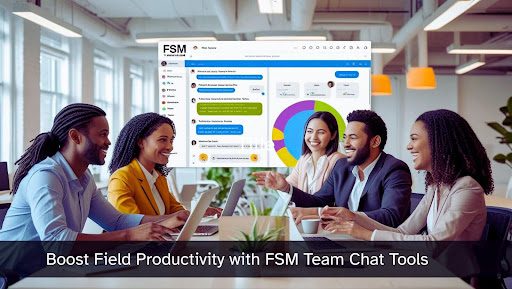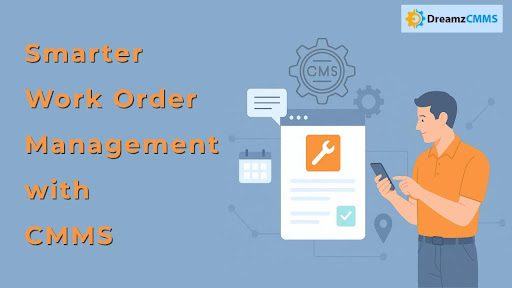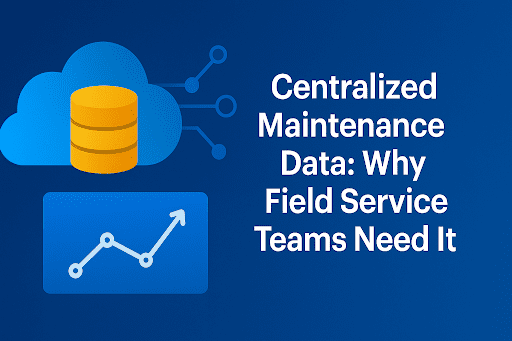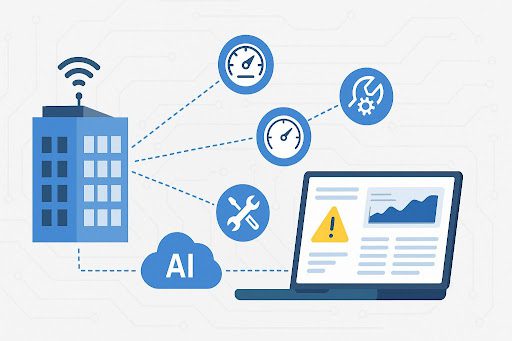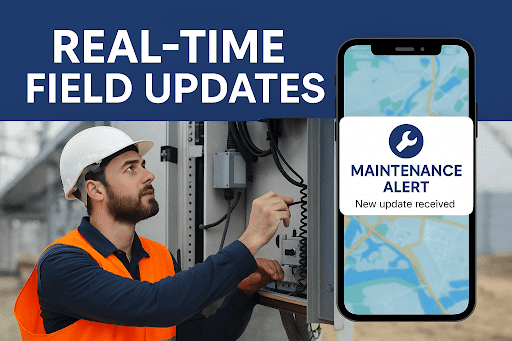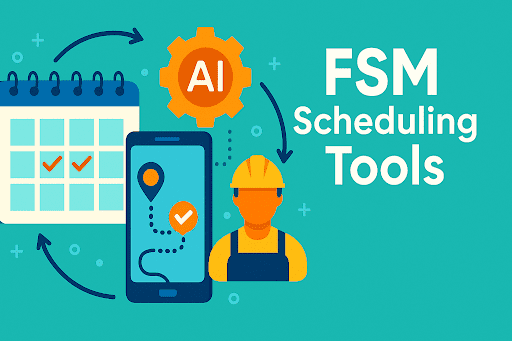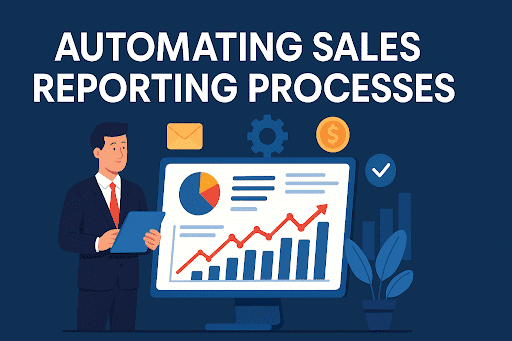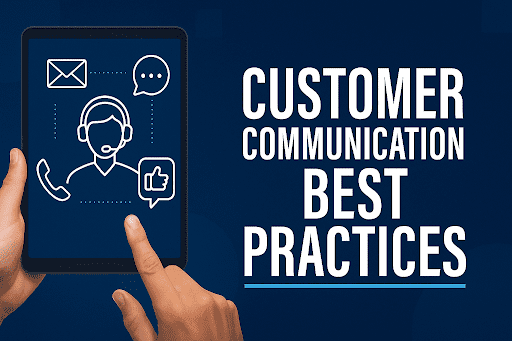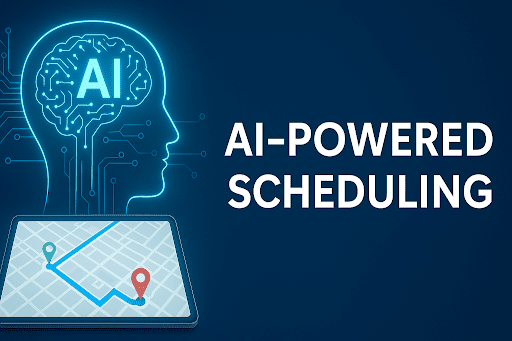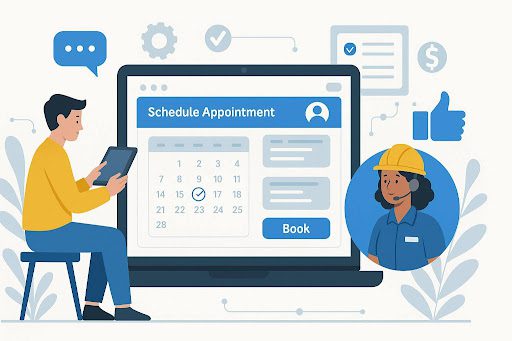 BACK TO Blog
BACK TO Blog
Asset Rental Management
Field Service
Boost Field Service Efficiency with Chatbot FSM Tools for Automated Communication
- June 25, 2025
- DreamzCMMS Team
- 10 minutes read

- June 25, 2025
- DreamzCMMS Team
- 10 minutes read
Modern field service industries require faster communication together with increased transparency between customers and field technicians and service managers. Modern real-time requirements exceed the capabilities of traditional phone calls along with manual email communications. The solution? AI technology combines with automation and field service excellence to create chatbot FSM tools.
These tools automate field service communication while simplifying technician assistance through chat-based virtual assistants to enhance customer relations. Field operations undergo a transformation because chatbot FSM tools allow automated work order scheduling and service team dispatching and real-time job update management.
This paper examines the changing field service management through chatbot integration and explains the current importance of adopting these technological developments.
Simplify Maintenance with Smart Asset Management
Modern intelligent tools help automate work orders while monitoring equipment health to minimize downtime.
Field efficiency improvement becomes possible through the combination of chatbot FSM tools with robust asset maintenance workflows.
Asset Maintenance Management Software
What Are Chatbot FSM Tools?
The implementation of chatbot FSM tools integrates artificial intelligence into field service platforms through smart conversational interfaces. Through their conversational interfaces chatbots enable automated communication between customers and technicians who use messaging systems and mobile applications and web-based portals.
The implementation of FSM communication tools backed by artificial intelligence allows chatbots to manage regular customer questions and enable self-help features and instant service status delivery to reduce operational workloads.
Core Capabilities:
The platform offers conversational interfaces that support users during scheduling tasks and ticket management and update procedures.
- The platform connects seamlessly to FSM software and mobile field applications.
- The system operates continuously to receive customer inquiries together with technician requests.
- Customers receive prompt assistance through our 24/7 service system.
- Predictive communication uses real-time service data in conjunction with AI technology for better operations.
The Growing Need for Chatbots in Field Service
Challenges in Traditional Field Service Communication
Numerous field service operations continue using outdated communication systems which produce inefficient results and unhappy customers despite digital advancements. Some of the most pressing challenges include:
- The system experiences delayed responses because it depends only on human operators for support.
The exclusive use of human agents to manage inquiries and schedule jobs and update customers leads to delayed responses particularly during busy times and non-business hours. The delayed responses create customer frustration which also affects the overall service delivery schedule.
- The combination of call centers with manual coordination systems leads to elevated operational expenses.
The maintenance of extensive call center staff and support desk operations for handling repeated communication duties leads to increased operational expenses. The process of manual job coordination between agents and dispatchers and technicians requires significant time and resources.
- The delivery of inaccurate service updates leads to unhappy customers.
Customers experience poor service because they do not receive timely updates about technician arrival times and service delays and job status. The absence of clear information breaks customer trust which results in more customer complaints.
- The combination of scheduling gaps and miscommunication leads to missed work orders.
Field teams experience scheduling problems and incorrect job details when they lack real-time tools which results in missed appointments and incorrect technician dispatches. The system inefficiencies together with repeated service calls and decreased first-time fix success rates emerge from these gaps.
AI chatbots for FSM teams provide scalable reliable instant communication solutions which solve the mentioned pain points. field service management tools that integrate modern capabilities with automated scheduling and chatbots receive investment from companies to resolve their operational issues.
Benefits of Chatbot FSM Tools
1. Real-Time Technician Updates
FSM field staff access job notifications and equipment information and location details through mobile chatbot tools that enable them to respond to updates and ask support questions and confirm services through a conversational interface.
2. Streamlined Customer Communication
The FSM customer service automation delivers appointment confirmations and issue resolutions as well as status updates through chat functions to customers. The implementation of chatbot FSM tools decreases human agent dependency while enhancing the speed of responses.
3. 24/7 Automated Support
The implementation of FSM support automation through chatbots allows businesses to deliver continuous service for all inquiries and scheduling and FAQs operations. The system delivers better customer service without requiring additional support personnel.
4. Intelligent Scheduling
The implementation of chatbot scheduling in field service workflows enables dispatchers to automate job assignments through skillset and geographical and availability criteria so they can dedicate time to exception management instead of handling routine tasks.
5. Self-Service Portals
The implementation of modern self-service portals that use chatbots for FSM enables customers to perform request logging and status checks and appointment cancellations which results in staff time savings while enabling users to maintain full control.
Real-World Applications of Smart FSM Chatbots
HVAC & Appliance Services
Customers utilize chatbot services to schedule repairs while obtaining time estimates and tracking part delivery progress. Field technicians use virtual assistant tools to get installation guides and perform service note logging and task completion confirmation.
Telecom Industry
Telecom subscribers interact with chat-based services for internet problem troubleshooting and service visit scheduling and technician arrival tracking in real time.
Facility & Property Management
Through chatbot technology tenants submit maintenance requests which receive automated status updates. Technician assistance chatbots enable facility managers to streamline their FSM operations when coordinating with contractors.
Utilities & Energy
Customers report power or water outages through bots. The use of chatbots for dispatch functions enables teams to receive updates which leads to immediate service resolution.
The improvement of time-sensitive operations depends heavily on enhancing first-time fix performance in industries where it matters. The implementation of chatbot FSM tools improving first-time fix rates by giving field technicians access to digital support as well as ensuring they arrive prepared and on schedule with necessary information.
How Chatbots Power AI-Driven FSM Communication
AI-Driven Recommendations
The system uses historical data to provide both technician recommendations and part availability alerts to users. The intelligent service ticket handling bots decrease resolution time to significant levels.
Predictive Insights
FSM managers can predict upcoming service demands and required parts and job delays through AI-powered FSM communication tools which helps them plan in advance.
Seamless Multichannel Support
Customers benefit from consistent communication through chatbot FSM tools across mobile apps, websites and WhatsApp particularly when field service operations span various locations.
Advanced Chatbot FSM tools include the following key features
Modern field service management chatbot tools contain multiple features which were designed to handle field service communication requirements. The following sections explain the essential features along with their operational benefits.
| Feature | Detailed Description |
| Real-Time Alerts | Job assignments along with technician arrivals and job rescheduling changes and service status updates receive immediate automated notifications from chatbots. Field staff and customers receive instant updates which decreases misunderstandings while preventing delays. Alerts send notifications through SMS together with in-app messages and email and WhatsApp messages. |
| Natural Language Processing (NLP) | The processing of human language through NLP technology allows chatbots to understand and produce responses which resemble human speech. The chatbot system provides precise responses to technician questions about their upcoming work schedule and customer requests to change their appointment dates. The system operates through language processing methods which create natural interactions for users. |
| Integration-Ready | The most advanced chatbot FSM tools provide seamless integration capabilities with FSM platforms alongside CRMs (including Salesforce) and ERPs (such as SAP) and asset databases. The bots can retrieve real-time data from schedules and customer records and technician schedules and parts stock information to provide contextual and immediate communication. |
| Multilingual Support | Many chatbot solutions provide multilingual functionality to support organizations which serve diverse geographic areas or customers who speak different languages. Users can communicate through their native language which enhances accessibility while improving their experience. |
| Actionable Responses | The capabilities of chatbots extend beyond question answering because they enable the creation of new service tickets and work order updates and technician dispatch and confirmation message delivery. The automated operational steps through this feature decrease human involvement during regular tasks. |
| Voice-Enabled Chatbots | These systems accept voice commands which allow field technicians to interact without needing their hands. The system provides job information as well as enables workers to update status reports and seek assistance through spoken commands when their hands are occupied or they work in harsh conditions. Voice chatbots provide mobile field workers with improved safety and operational efficiency. |
Chatbot FSM Tools vs. Traditional Field Communication
| Criteria | Traditional Approach | Chatbot FSM Tools |
| Availability | Limited to business hours | 24/7 support |
| Cost | High support staff requirement | Low operational cost |
| Speed | Manual updates and scheduling | Instant automation |
| Scalability | Difficult without expanding team | Scales with demand |
| Traceability | Limited documentation | Full chat transcripts and history |
Integration with Field Service Platforms
Major field service management platforms including DreamzCMMS Field Service Software and Salesforce Field Service and ServiceMax and Oracle FSM and Zuper FSM are supported by effective chatbot FSM tools. A number of FSM platforms have been integrated with the chatbot system including DreamzCMMS Field Service Software and Salesforce Field Service and ServiceMax and Oracle FSM and Zuper FSM.
This integration enables the bots to have access to the following information:
- Job orders and technician schedules
- Customer information and service history
- Inventory and parts database
- SLA monitoring and reporting modules
Through these integrations real-time support bots for FSM teams can perform direct actions like technician assignment and work order updates and service outcome recording.
Effective chatbot FSM tools are not standalone—they integrate with major FSM platforms. The work orders with field service management tools enable chatbot interfaces to perform automatic ticket creation, updates, and closure functions which minimizes manual work for both technicians and reduces their overall workload.
Effective chatbot FSM tools are not standalone—they integrate with major FSM software like DreamzCMMS Field Service Management Software. The platforms enable work orders through field service management tools so chatbot interfaces can automate ticket creation, updates and closure while decreasing manual work and technician involvement.
Sales teams working alongside service departments can also benefit. The integration between FSM tools and field sales software provides businesses with shared data and real-time communication and automated customer updates which aligns sales reps and technicians.
Best Practices for Implementing Chatbot FSM Tools
1. Define Specific Use Cases
The first step involves defining the specific goals which include support load reduction, dispatch speed improvement and customer engagement enhancement.
2. Choose FSM-Compatible Chatbots
The chatbot system needs to have direct access to field service information in order to respond in real time.
3. Design Conversation Flows
Use field-specific queries and responses. For example: “Reschedule my AC repair” or “Log water meter issue.”
4. Train with Field Scenarios
The bot can be trained for technician support and scheduling anomalies and asset tracking using real-world job data.
5. Monitor and Improve
The optimization of chatbot performance will be achieved through tracking KPIs which include resolution time and number of automated conversations and CSAT scores.
Final Thoughts
The entire service journey benefits from chatbot FSM tools which provide efficient automated intelligent communication for customer inquiries and technician support. The bots serve as essential components for responsive field service delivery because they manage job scheduling and ticket updates and dispatch coordination tasks.
The demand for real-time responsiveness and self-service will make businesses that implement chatbot integration for field service management more competitive because they deliver better experiences and simplify operations.
Get Started with DreamzCMMS Today
Streamline field operations with chatbot-driven communication, smart automation, and real-time technician support.
Discover the full potential of FSM with DreamzCMMS’s intelligent tools and integrations.
Ready for More?
Talk to one of our CMMS experts and see how DreamzCMMS can simplify your maintenance operations.
Book a free consultation